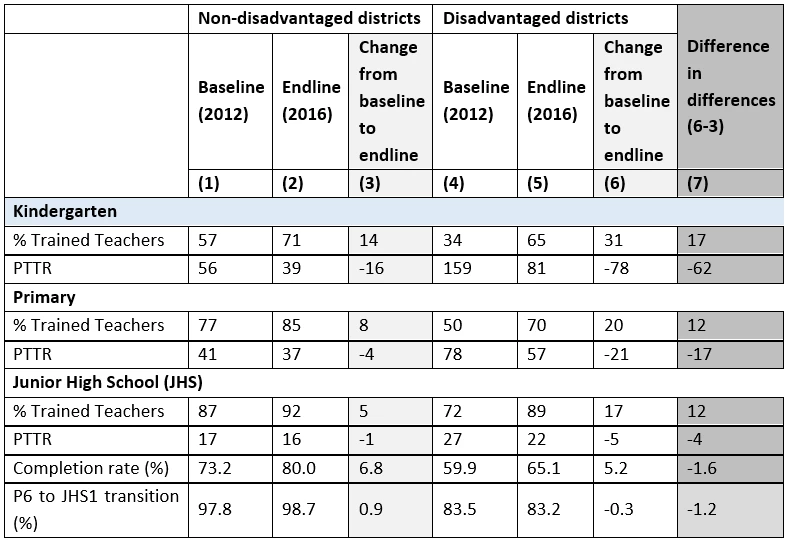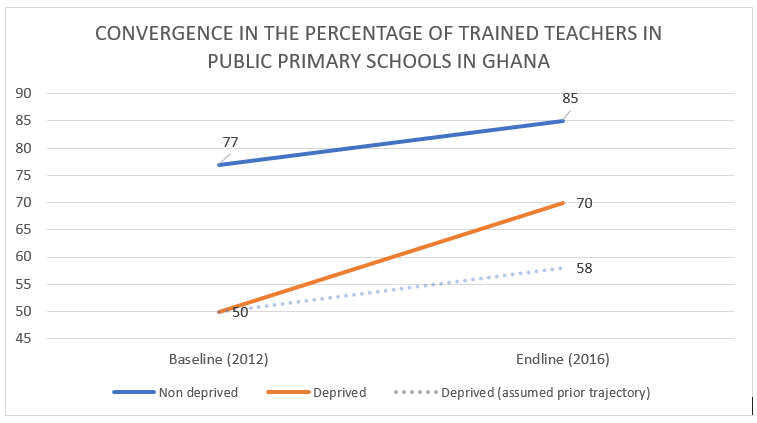
With inputs from Deborah Mikesell, Peter Darvas and Natasha Somji
In 2012, Ghana faced a daunting challenge. There was a wide disparity in the percentage of trained teachers and in learning outcomes, between the economically and educationally disadvantaged districts of Northern Ghana and the relatively more affluent non-disadvantaged districts further south. More than half the teachers in the disadvantaged districts were untrained and the Ministry of Education was growing increasingly concerned about the impact of this gap in teaching quality on students’ learning outcomes and life prospects.
Fortunately, at that time, Ghana was in the process of receiving a grant from the Global Partnership for Education (GPE) to improve basic education in the country, with The World Bank serving as the grant agency. The Ministry of Education decided to channel part of these resources into a teacher training program of their own design, which had recently been rolled-out in Northern Ghana.
Nearly 8,000 young teachers from disadvantaged districts were selected to receive training. Since they had been teaching in these districts for several years, they had roots within the communities. Trainings took place during the holiday season (summer break, Easter and Christmas) and through distance learning.
By keeping to this timetable, the Untrained Teachers Diploma in Basic Education (UTDBE) training program kept teachers teaching in their schools while simultaneously upgrading their skills. The training was conducted using the same curriculum as the three-year pre-service program (known as Diploma in Basic Education or DBE) but took place over a four-year period.
Four years later, how do the teachers compare?
Following the training, an impact evaluation found that teachers trained under the project and under the traditional pre-service program had comparable skillsets. About 400 of the UTDBE trainees and 185 of the pre-service training graduates were observed in a classroom setting and graded on lesson planning and preparation, classroom methodology and delivery, and class management and organization. The UTDBE trainees showed average scores similar to the pre-service training teachers.
UTDBE was more cost-effective than pre-service training. The cost to the government of providing training for one teacher under UTDBE was $2,130 compared to $3,409 under the pre-service training model. This means that training a student using the conventional mode of training is 60 percent more expensive than UTDBE. Thus, the UTDBE program proved to be more cost-effective while training teachers to achieve the same skills and certification at similar levels of attrition.
Training UTDBE teachers has increased the percentage of trained teachers among students in disadvantaged districts, increasing the opportunities for students to receive individual attention from qualified teachers. As the table below shows, while the proportion of trained teachers has increased nationwide during the duration of the project, the increase in disadvantaged districts has outpaced that of non-disadvantaged districts across all levels of basic education.

The convergence in the percentage of trained teachers between disadvantaged and non-disadvantaged districts is likely to remain persistent. Most UTDBE teachers had been teaching in disadvantaged districts for several years prior to being selected for the program and are willing to continue in the communities in which they teach. As an additional safeguard, UTDBE teachers are bonded to stay within the same school in disadvantaged areas for at least another two years after the successful completion of their training.

A note of caution: It is too early to assess if the skills gained by the UTDBE teachers will be sustained over time and whether the improved quality of teaching will increase learning outcomes in Northern Ghana. As the table above shows, though disadvantaged districts have shown improvements in completion rates, improvements in non-disadvantaged districts outpaced disadvantaged districts in primary completion rates and transition rates. A longer-term evaluation may be necessary to see if the skills are retained by the UTDBE teachers and whether non-disadvantaged districts show an additional improvement in learning outcomes that may be attributable to the improved quality of teaching.
More evidence on the efficacy of this program from other countries may help spread this Ghanaian innovation and make teacher training more cost-effective, while ensuring that teachers continue teaching while they study.
Find out more about World Bank Group education on our website and on Twitter .
See this video about why teachers matter.


Join the Conversation